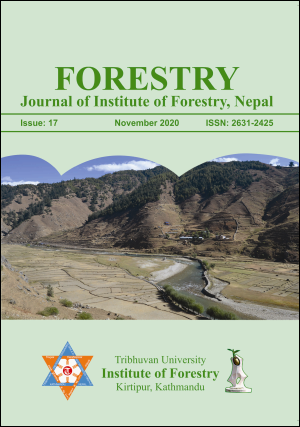Assessment of Productivity and Profitability through Scientific Forest Management in Sal (Shorea robusta) Forest of Nepal: A Case Study from Patela Community Forest, Kailali District, Nepal
DOI:
https://doi.org/10.3126/forestry.v17i0.33620Keywords:
Community forest, regeneration, plant diversity, income, silvicultural interventionAbstract
Scientific forest management (SciFM) ensures improved productivity and healthy forests that are crucial for the economic development and prosperity of forest-dependent country like Nepal. This study analyzes the effects of the silvicultural intervention on the regeneration of Sal (Shorea robusta), plant species diversity, and income through the flow of forest products in the Patela Community Forest in Kailali District of Nepal, where Sal (S. robusta) forest has been managed under an Irregular Shelterwood System with 80 years of the rotation period since fiscal year 2017/18. The vegetation sampling was done by the quadrat method based on the principle of stratified random sampling from the managed and unmanaged parts of the forest. The climate based site productivity was analyzed. The profitability of scientific forest management was analyzed by income and cost incurred in managing the forest. The study revealed the promising regeneration of S. robusta in the managed areas compared to the unmanaged area. The silvicultural intervention had a significant negative effect on plant diversity showing an increase in the concentration of dominance of S. robusta. An implementation of SciFM plan generated a total net benefit of 187,000 US$ in the last 2017/18, and 2018/19 fiscal years. This study recommends existing natural forests to be managed based on sound silvicultural principles to improve the degrading nature of the productive forest that can generate revenue for the country and opportunity for community development.
Downloads
Downloads
Published
How to Cite
Issue
Section
License
© Tribhuvan University, Institute of Forestry




